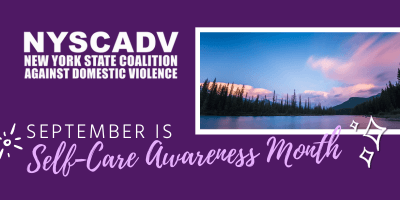
September marks National Self-Care Awareness Month, a time to recognize and celebrate the tireless efforts of advocates and programs dedicated to supporting survivors of domestic violence, sexual violence, and crime. Advocates work diligently to provide survivors with essential services while also prioritizing their own self-care and well-being. It is crucial to recognize their challenges and establish healthy habits to sustain their work and personal lives.
Advocates working within the realms of domestic violence, sexual violence, and crime victim advocacy often confront organizational and individual trauma, burnout, and compassion fatigue due to the emotionally demanding nature of their work. The need for self-care extends beyond personal well-being—it's a cornerstone of building a sustainable work-life balance and fostering a supportive work environment at both the individual and organizational levels.
Advocates are uniquely susceptible to organizational trauma due to the intense nature of their work. Organizational culture itself can amplify this intensity through the demands of the workload and communication dynamics. NYSCADV acknowledges the need for strategies to build resilience against this trauma and manage its effects when they arise. Factors such as a solid organizational identity, positive leadership, practical structures, and connections with peer agencies can be tools to safeguard an organization's well-being.
We recognize the significance of advocates' work and are committed to providing resources that fortify their resilience, wellness, and self-care practices. NYSCADV has meticulously curated various resources, ranging from webinars to toolkits, designed to help advocates navigate the challenges they encounter, enhance their well-being, and enrich the quality of their work.
A selection of these resources includes:
- CONNECT's Toolkit on Burnout and Vicarious Trauma: Addressing the impact of trauma, this toolkit focuses on self-care and healing, tailored to organizers combating racism, police brutality, and various movements.
- Self-Care for Advocates: A non-profit organization that promotes self-care and well-being among Anti-Violence advocates to prevent work-related stress and exhaustion.
- Office for Victims of Crime's Vicarious Trauma Toolkit: A comprehensive resource designed to help organizations become vicarious trauma-informed, supporting staff exposed to traumatic experiences.
Click here to view the self-care toolkit.
In addition to the self-care toolkit, NYSCADV invites you to join us as we participate in the 21-day self-care challenge throughout September. Created by Move to End Violence, this challenge is designed for social change advocates to help build a robust community of movement activists by establishing intentional self-care practices for a sustainable and more impactful life. Starting Monday, September 9, NYSCADV will post one self-care strategy daily across our social media platforms. Miss a day or want to look ahead? View the challenge packet here.
As the fight against domestic and sexual violence continues, supporting advocates and prioritizing their self-care cannot be overstated. These resources serve as a testament to the dedication of NYSCADV and other organizations in fostering a holistic approach that recognizes the need for resilience, well-being, and sustainability in this vital advocacy work. Advocates' self-care is not just an individual endeavor but a collective responsibility, ensuring they can continue making a meaningful impact on the lives of survivors and contributing to a safer, more compassionate world.


